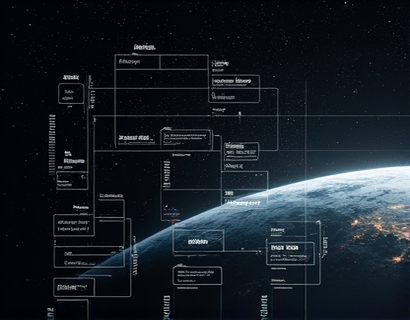Decentralized DAO Management: Harnessing Advanced Software for Optimal Governance and Analytics
In the rapidly evolving landscape of decentralized finance and autonomous organizations, the management of Decentralized Autonomous Organizations (DAOs) has become a critical area of focus. Traditional governance models are being reimagined to leverage the power of decentralization, transparency, and community involvement. However, effective governance in a DAO requires more than just a decentralized structure; it demands advanced software solutions that can streamline management processes, provide deep analytics, and facilitate data-driven decision-making. This article delves into the transformative potential of cutting-edge software designed specifically for DAO management, highlighting how these tools can enhance governance, collaboration, and overall sustainability.
Understanding DAO Governance Challenges
DAOs operate on blockchain technology, utilizing smart contracts to automate and enforce governance rules. While this approach offers numerous advantages, such as reduced reliance on intermediaries and increased transparency, it also presents unique challenges. One of the primary challenges is the complexity of managing a distributed network of stakeholders, each with their own interests and levels of technical expertise. Traditional governance mechanisms often struggle to scale and adapt to the dynamic nature of DAOs, leading to inefficiencies and potential conflicts.
Another significant challenge is the lack of robust analytics and reporting tools. Without comprehensive insights into the organization's performance, decision-makers face difficulties in assessing the impact of their governance actions. This can result in suboptimal decisions and a lack of trust among community members. To overcome these challenges, advanced software solutions are essential, providing the necessary tools to streamline governance and enhance transparency.
Key Features of Advanced DAO Management Software
Advanced DAO management software is designed to address the multifaceted needs of DAO administrators and members. These platforms offer a range of features that collectively contribute to more efficient and effective governance. Some of the key features include:
- Delegation and Voting Systems: Streamlined processes for proposing, discussing, and voting on governance proposals. These systems ensure that all stakeholders have a clear and fair opportunity to participate in decision-making.
- Role-Based Access Control: Fine-grained permission settings to manage who can view, propose, or vote on governance actions. This helps maintain security and ensures that only authorized individuals can perform sensitive operations.
- Real-Time Analytics and Reporting: Comprehensive dashboards and reports that provide insights into the DAO's performance, including financial metrics, community engagement, and proposal outcomes. These analytics tools help administrators make informed decisions based on real-time data.
- Community Engagement Tools: Features that facilitate communication and collaboration among community members, such as discussion forums, polls, and event scheduling. These tools foster a sense of community and encourage active participation in governance.
- Smart Contract Integration: Seamless integration with smart contracts to automate governance processes, ensuring that rules are enforced consistently and transparently. This reduces the risk of human error and enhances trust in the governance system.
Enhancing Governance through Data-Driven Decision-Making
One of the most significant benefits of advanced DAO management software is its ability to transform governance from an intuitive process to a data-driven one. By leveraging real-time analytics and comprehensive reporting, administrators can gain deep insights into various aspects of the DAO's operation. For instance, financial analytics can help track budget allocations, expenditure patterns, and revenue streams, enabling better financial planning and resource management.
Community engagement metrics provide valuable feedback on member participation and sentiment, allowing administrators to identify areas for improvement and foster a more inclusive and active community. Proposal analytics offer insights into the popularity and impact of governance proposals, helping to refine the proposal process and increase stakeholder buy-in. These data-driven insights not only enhance the quality of decisions but also build trust and transparency within the community.
Streamlining Collaboration and Communication
Effective collaboration and communication are cornerstones of successful DAO governance. Advanced management software includes features that facilitate seamless interaction among stakeholders. Discussion forums and chat platforms enable real-time communication, ensuring that important topics are discussed promptly and efficiently. Polls and surveys provide structured ways to gather community input on various issues, ensuring that diverse perspectives are considered in the decision-making process.
Event scheduling tools help organize and promote community events, workshops, and meetings, fostering a sense of community and engagement. By centralizing these communication channels within the governance platform, administrators can reduce the fragmentation often seen in decentralized networks, making it easier for members to stay informed and involved.
Ensuring Security and Compliance
Security is a paramount concern in the decentralized ecosystem, and advanced DAO management software addresses this through robust security features. Role-based access control ensures that only authorized individuals can perform critical operations, reducing the risk of unauthorized access or manipulation. Additionally, audit trails and logging mechanisms provide a transparent record of all governance actions, enhancing accountability and trust.
Compliance with regulatory requirements is another critical aspect of DAO governance. Advanced software can help ensure that the organization adheres to relevant laws and regulations by providing tools for compliance monitoring and reporting. This is particularly important as the regulatory landscape for decentralized organizations continues to evolve.
Case Studies and Real-World Applications
Several DAOs have successfully implemented advanced management software to enhance their governance processes. One notable example is a decentralized cryptocurrency project that utilized a governance platform to streamline proposal and voting processes. By introducing role-based access control and real-time analytics, the project saw a significant increase in stakeholder participation and more informed decision-making. The platform's comprehensive reporting tools also helped the project team identify trends and areas for improvement, leading to more sustainable growth.
Another case involves a decentralized social media platform that leveraged community engagement tools to foster a more active and engaged user base. By implementing discussion forums and event scheduling, the platform managed to increase user interaction and community cohesion. The platform's governance software also facilitated transparent financial management, with real-time budget tracking and expenditure reports, which helped build trust among users.
Future Trends in DAO Management Software
The landscape of DAO management software is continually evolving, driven by advancements in blockchain technology, machine learning, and user interface design. Future trends include:
- Enhanced User Interfaces: More intuitive and user-friendly interfaces that cater to both technical and non-technical users, making governance more accessible.
- Predictive Analytics: Advanced machine learning algorithms that can predict governance outcomes and suggest optimal decision paths based on historical data and trends.
- Integrated Identity Management: Seamless integration with decentralized identity solutions to simplify user authentication and enhance security.
- Cross-DAO Collaboration: Platforms that enable collaboration and governance across multiple DAOs, fostering a more interconnected decentralized ecosystem.
Conclusion
Advanced DAO management software is revolutionizing the way decentralized organizations are governed. By providing streamlined governance processes, deep analytics, and robust collaboration tools, these platforms enable data-driven decision-making and sustainable growth. As the DAO ecosystem continues to mature, the importance of sophisticated management software will only increase. For DAO managers and administrators, embracing these tools is not just a strategic advantage but a necessity for success in the decentralized world.










































